Coaching and Mentoring Skills for the Workplace - Leadership
VerifiedAdded on 2023/06/16
|13
|3256
|331
Report
AI Summary
This report examines the critical roles of coaching and mentoring in the workplace, highlighting their similarities and differences, and emphasizing the skills required for line managers to effectively mentor and coach their teams. It delves into how coaching and mentoring support employees in managing change and building resilience by fostering optimism, openness to new ideas, self-assurance, structured thinking, and a willingness to support. The report also includes a personal reflection using Gibbs Reflective Cycle, addressing time management and prioritization issues, and emphasizes the positive interactions with a mentor in finding solutions. The document concludes by underscoring the importance of both coaching and mentoring in helping individuals navigate complexities and embrace change, with Desklib providing further resources for students.
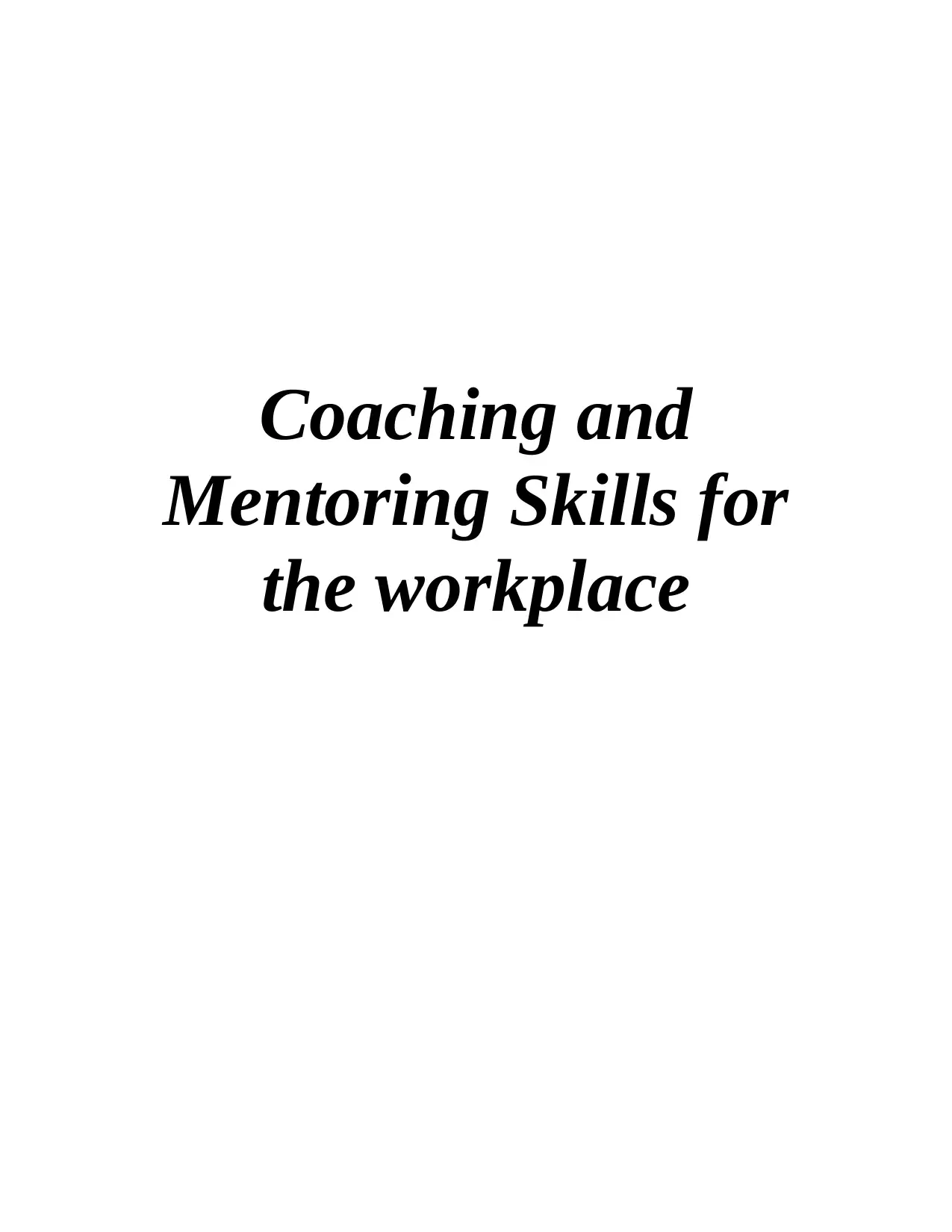
Coaching and
Mentoring Skills for
the workplace
Mentoring Skills for
the workplace
Paraphrase This Document
Need a fresh take? Get an instant paraphrase of this document with our AI Paraphraser
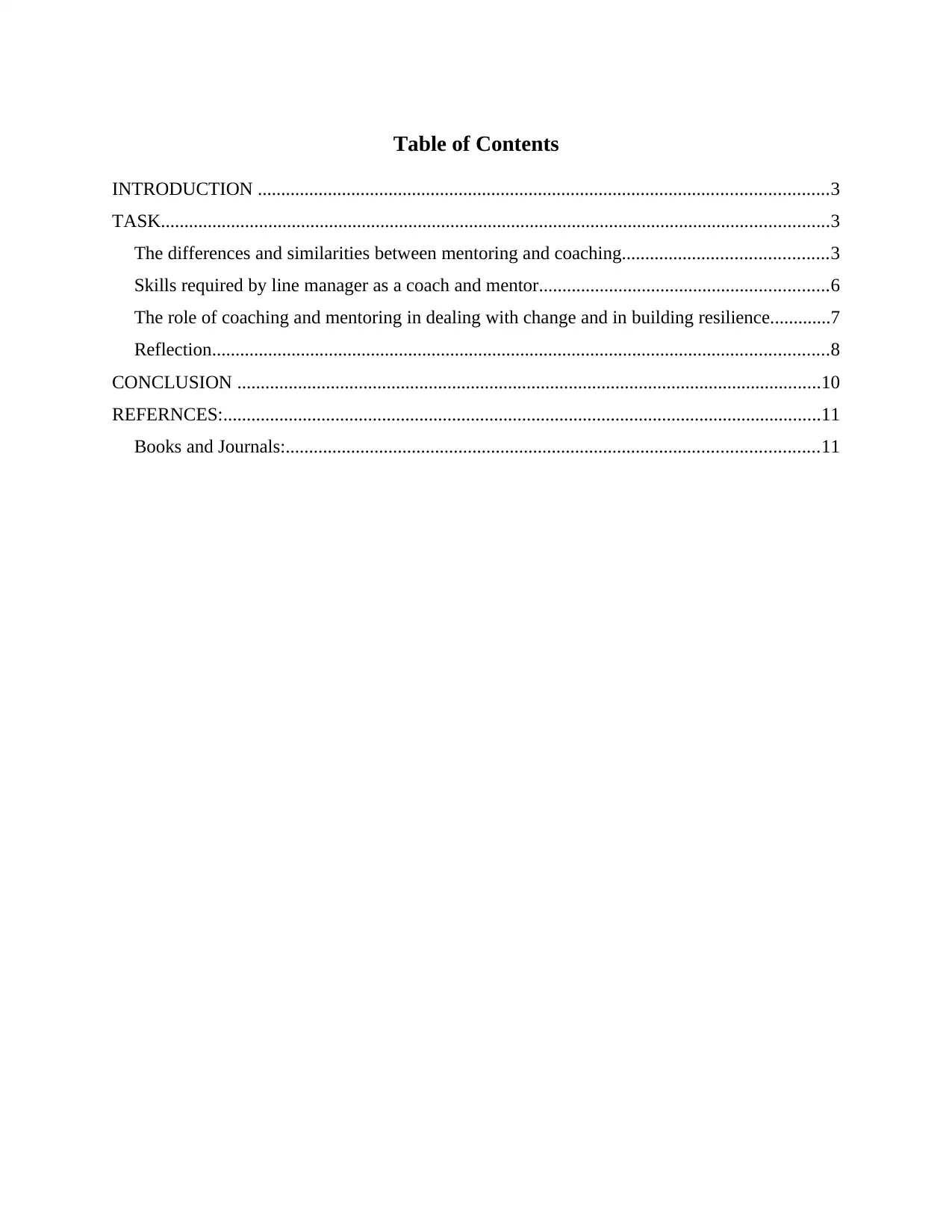
Table of Contents
INTRODUCTION ..........................................................................................................................3
TASK...............................................................................................................................................3
The differences and similarities between mentoring and coaching............................................3
Skills required by line manager as a coach and mentor..............................................................6
The role of coaching and mentoring in dealing with change and in building resilience.............7
Reflection....................................................................................................................................8
CONCLUSION .............................................................................................................................10
REFERNCES:................................................................................................................................11
Books and Journals:..................................................................................................................11
INTRODUCTION ..........................................................................................................................3
TASK...............................................................................................................................................3
The differences and similarities between mentoring and coaching............................................3
Skills required by line manager as a coach and mentor..............................................................6
The role of coaching and mentoring in dealing with change and in building resilience.............7
Reflection....................................................................................................................................8
CONCLUSION .............................................................................................................................10
REFERNCES:................................................................................................................................11
Books and Journals:..................................................................................................................11
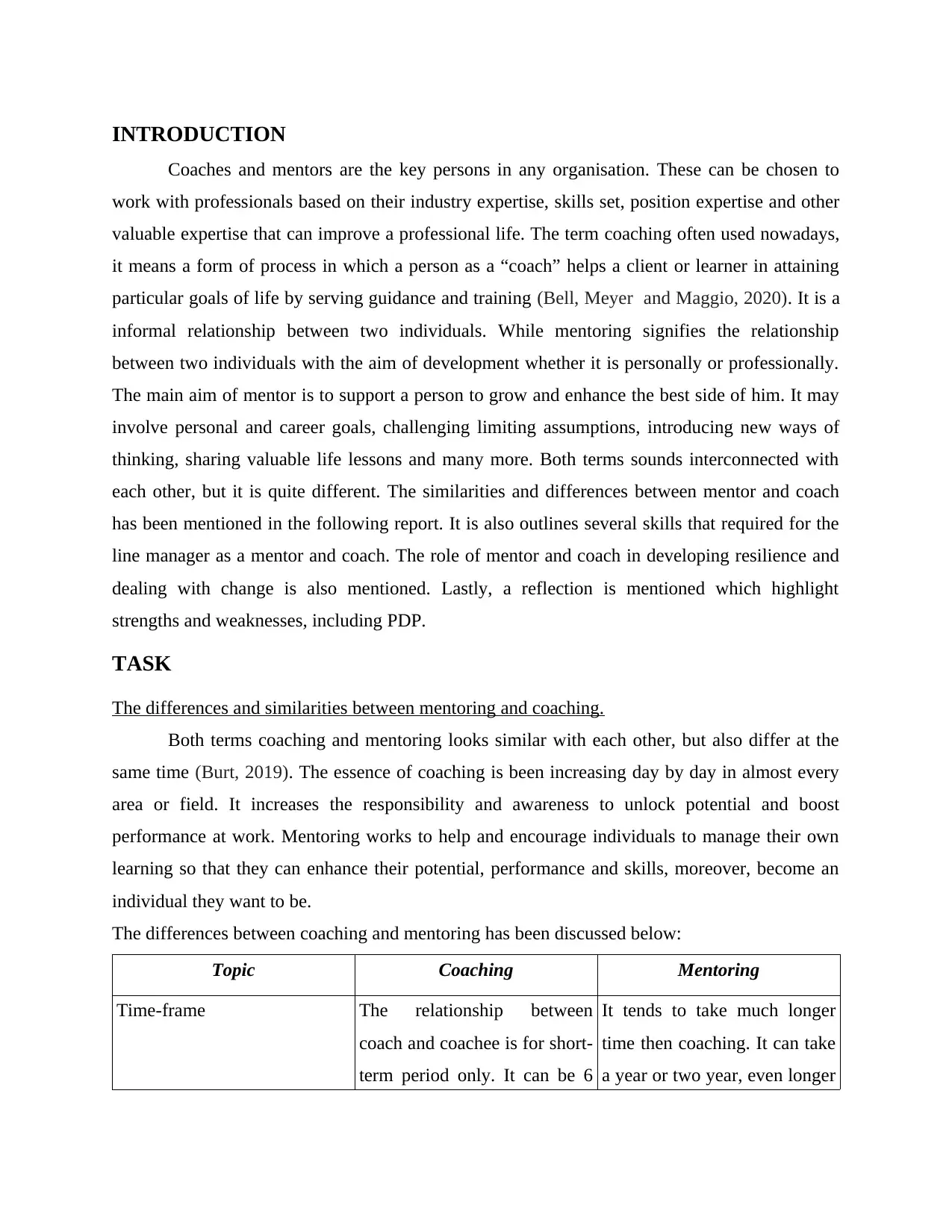
INTRODUCTION
Coaches and mentors are the key persons in any organisation. These can be chosen to
work with professionals based on their industry expertise, skills set, position expertise and other
valuable expertise that can improve a professional life. The term coaching often used nowadays,
it means a form of process in which a person as a “coach” helps a client or learner in attaining
particular goals of life by serving guidance and training (Bell, Meyer and Maggio, 2020). It is a
informal relationship between two individuals. While mentoring signifies the relationship
between two individuals with the aim of development whether it is personally or professionally.
The main aim of mentor is to support a person to grow and enhance the best side of him. It may
involve personal and career goals, challenging limiting assumptions, introducing new ways of
thinking, sharing valuable life lessons and many more. Both terms sounds interconnected with
each other, but it is quite different. The similarities and differences between mentor and coach
has been mentioned in the following report. It is also outlines several skills that required for the
line manager as a mentor and coach. The role of mentor and coach in developing resilience and
dealing with change is also mentioned. Lastly, a reflection is mentioned which highlight
strengths and weaknesses, including PDP.
TASK
The differences and similarities between mentoring and coaching.
Both terms coaching and mentoring looks similar with each other, but also differ at the
same time (Burt, 2019). The essence of coaching is been increasing day by day in almost every
area or field. It increases the responsibility and awareness to unlock potential and boost
performance at work. Mentoring works to help and encourage individuals to manage their own
learning so that they can enhance their potential, performance and skills, moreover, become an
individual they want to be.
The differences between coaching and mentoring has been discussed below:
Topic Coaching Mentoring
Time-frame The relationship between
coach and coachee is for short-
term period only. It can be 6
It tends to take much longer
time then coaching. It can take
a year or two year, even longer
Coaches and mentors are the key persons in any organisation. These can be chosen to
work with professionals based on their industry expertise, skills set, position expertise and other
valuable expertise that can improve a professional life. The term coaching often used nowadays,
it means a form of process in which a person as a “coach” helps a client or learner in attaining
particular goals of life by serving guidance and training (Bell, Meyer and Maggio, 2020). It is a
informal relationship between two individuals. While mentoring signifies the relationship
between two individuals with the aim of development whether it is personally or professionally.
The main aim of mentor is to support a person to grow and enhance the best side of him. It may
involve personal and career goals, challenging limiting assumptions, introducing new ways of
thinking, sharing valuable life lessons and many more. Both terms sounds interconnected with
each other, but it is quite different. The similarities and differences between mentor and coach
has been mentioned in the following report. It is also outlines several skills that required for the
line manager as a mentor and coach. The role of mentor and coach in developing resilience and
dealing with change is also mentioned. Lastly, a reflection is mentioned which highlight
strengths and weaknesses, including PDP.
TASK
The differences and similarities between mentoring and coaching.
Both terms coaching and mentoring looks similar with each other, but also differ at the
same time (Burt, 2019). The essence of coaching is been increasing day by day in almost every
area or field. It increases the responsibility and awareness to unlock potential and boost
performance at work. Mentoring works to help and encourage individuals to manage their own
learning so that they can enhance their potential, performance and skills, moreover, become an
individual they want to be.
The differences between coaching and mentoring has been discussed below:
Topic Coaching Mentoring
Time-frame The relationship between
coach and coachee is for short-
term period only. It can be 6
It tends to take much longer
time then coaching. It can take
a year or two year, even longer
⊘ This is a preview!⊘
Do you want full access?
Subscribe today to unlock all pages.

Trusted by 1+ million students worldwide
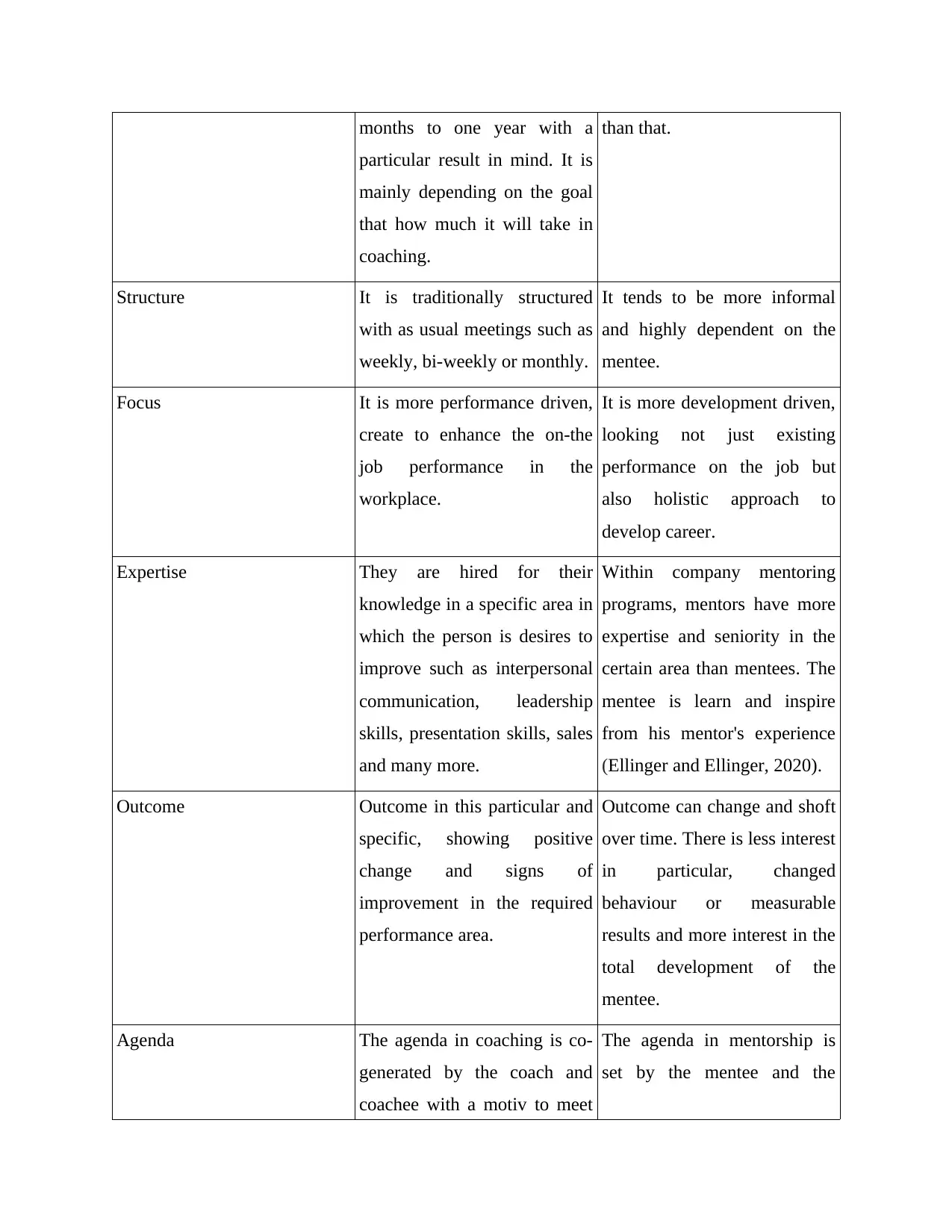
months to one year with a
particular result in mind. It is
mainly depending on the goal
that how much it will take in
coaching.
than that.
Structure It is traditionally structured
with as usual meetings such as
weekly, bi-weekly or monthly.
It tends to be more informal
and highly dependent on the
mentee.
Focus It is more performance driven,
create to enhance the on-the
job performance in the
workplace.
It is more development driven,
looking not just existing
performance on the job but
also holistic approach to
develop career.
Expertise They are hired for their
knowledge in a specific area in
which the person is desires to
improve such as interpersonal
communication, leadership
skills, presentation skills, sales
and many more.
Within company mentoring
programs, mentors have more
expertise and seniority in the
certain area than mentees. The
mentee is learn and inspire
from his mentor's experience
(Ellinger and Ellinger, 2020).
Outcome Outcome in this particular and
specific, showing positive
change and signs of
improvement in the required
performance area.
Outcome can change and shoft
over time. There is less interest
in particular, changed
behaviour or measurable
results and more interest in the
total development of the
mentee.
Agenda The agenda in coaching is co-
generated by the coach and
coachee with a motiv to meet
The agenda in mentorship is
set by the mentee and the
particular result in mind. It is
mainly depending on the goal
that how much it will take in
coaching.
than that.
Structure It is traditionally structured
with as usual meetings such as
weekly, bi-weekly or monthly.
It tends to be more informal
and highly dependent on the
mentee.
Focus It is more performance driven,
create to enhance the on-the
job performance in the
workplace.
It is more development driven,
looking not just existing
performance on the job but
also holistic approach to
develop career.
Expertise They are hired for their
knowledge in a specific area in
which the person is desires to
improve such as interpersonal
communication, leadership
skills, presentation skills, sales
and many more.
Within company mentoring
programs, mentors have more
expertise and seniority in the
certain area than mentees. The
mentee is learn and inspire
from his mentor's experience
(Ellinger and Ellinger, 2020).
Outcome Outcome in this particular and
specific, showing positive
change and signs of
improvement in the required
performance area.
Outcome can change and shoft
over time. There is less interest
in particular, changed
behaviour or measurable
results and more interest in the
total development of the
mentee.
Agenda The agenda in coaching is co-
generated by the coach and
coachee with a motiv to meet
The agenda in mentorship is
set by the mentee and the
Paraphrase This Document
Need a fresh take? Get an instant paraphrase of this document with our AI Paraphraser

the results. mentor helps in that agenda.
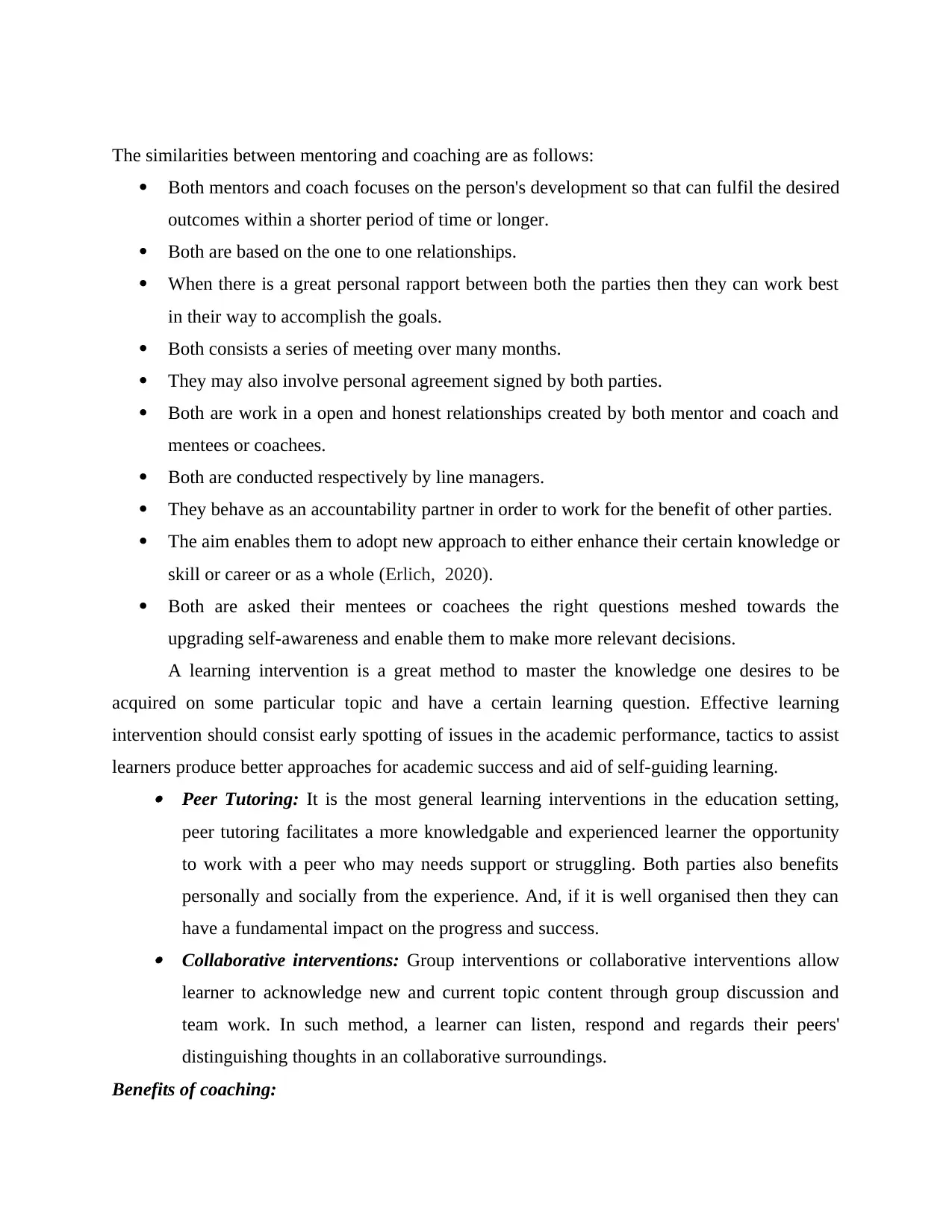
The similarities between mentoring and coaching are as follows:
Both mentors and coach focuses on the person's development so that can fulfil the desired
outcomes within a shorter period of time or longer.
Both are based on the one to one relationships.
When there is a great personal rapport between both the parties then they can work best
in their way to accomplish the goals.
Both consists a series of meeting over many months.
They may also involve personal agreement signed by both parties.
Both are work in a open and honest relationships created by both mentor and coach and
mentees or coachees.
Both are conducted respectively by line managers.
They behave as an accountability partner in order to work for the benefit of other parties.
The aim enables them to adopt new approach to either enhance their certain knowledge or
skill or career or as a whole (Erlich, 2020).
Both are asked their mentees or coachees the right questions meshed towards the
upgrading self-awareness and enable them to make more relevant decisions.
A learning intervention is a great method to master the knowledge one desires to be
acquired on some particular topic and have a certain learning question. Effective learning
intervention should consist early spotting of issues in the academic performance, tactics to assist
learners produce better approaches for academic success and aid of self-guiding learning. Peer Tutoring: It is the most general learning interventions in the education setting,
peer tutoring facilitates a more knowledgable and experienced learner the opportunity
to work with a peer who may needs support or struggling. Both parties also benefits
personally and socially from the experience. And, if it is well organised then they can
have a fundamental impact on the progress and success. Collaborative interventions: Group interventions or collaborative interventions allow
learner to acknowledge new and current topic content through group discussion and
team work. In such method, a learner can listen, respond and regards their peers'
distinguishing thoughts in an collaborative surroundings.
Benefits of coaching:
Both mentors and coach focuses on the person's development so that can fulfil the desired
outcomes within a shorter period of time or longer.
Both are based on the one to one relationships.
When there is a great personal rapport between both the parties then they can work best
in their way to accomplish the goals.
Both consists a series of meeting over many months.
They may also involve personal agreement signed by both parties.
Both are work in a open and honest relationships created by both mentor and coach and
mentees or coachees.
Both are conducted respectively by line managers.
They behave as an accountability partner in order to work for the benefit of other parties.
The aim enables them to adopt new approach to either enhance their certain knowledge or
skill or career or as a whole (Erlich, 2020).
Both are asked their mentees or coachees the right questions meshed towards the
upgrading self-awareness and enable them to make more relevant decisions.
A learning intervention is a great method to master the knowledge one desires to be
acquired on some particular topic and have a certain learning question. Effective learning
intervention should consist early spotting of issues in the academic performance, tactics to assist
learners produce better approaches for academic success and aid of self-guiding learning. Peer Tutoring: It is the most general learning interventions in the education setting,
peer tutoring facilitates a more knowledgable and experienced learner the opportunity
to work with a peer who may needs support or struggling. Both parties also benefits
personally and socially from the experience. And, if it is well organised then they can
have a fundamental impact on the progress and success. Collaborative interventions: Group interventions or collaborative interventions allow
learner to acknowledge new and current topic content through group discussion and
team work. In such method, a learner can listen, respond and regards their peers'
distinguishing thoughts in an collaborative surroundings.
Benefits of coaching:
⊘ This is a preview!⊘
Do you want full access?
Subscribe today to unlock all pages.

Trusted by 1+ million students worldwide
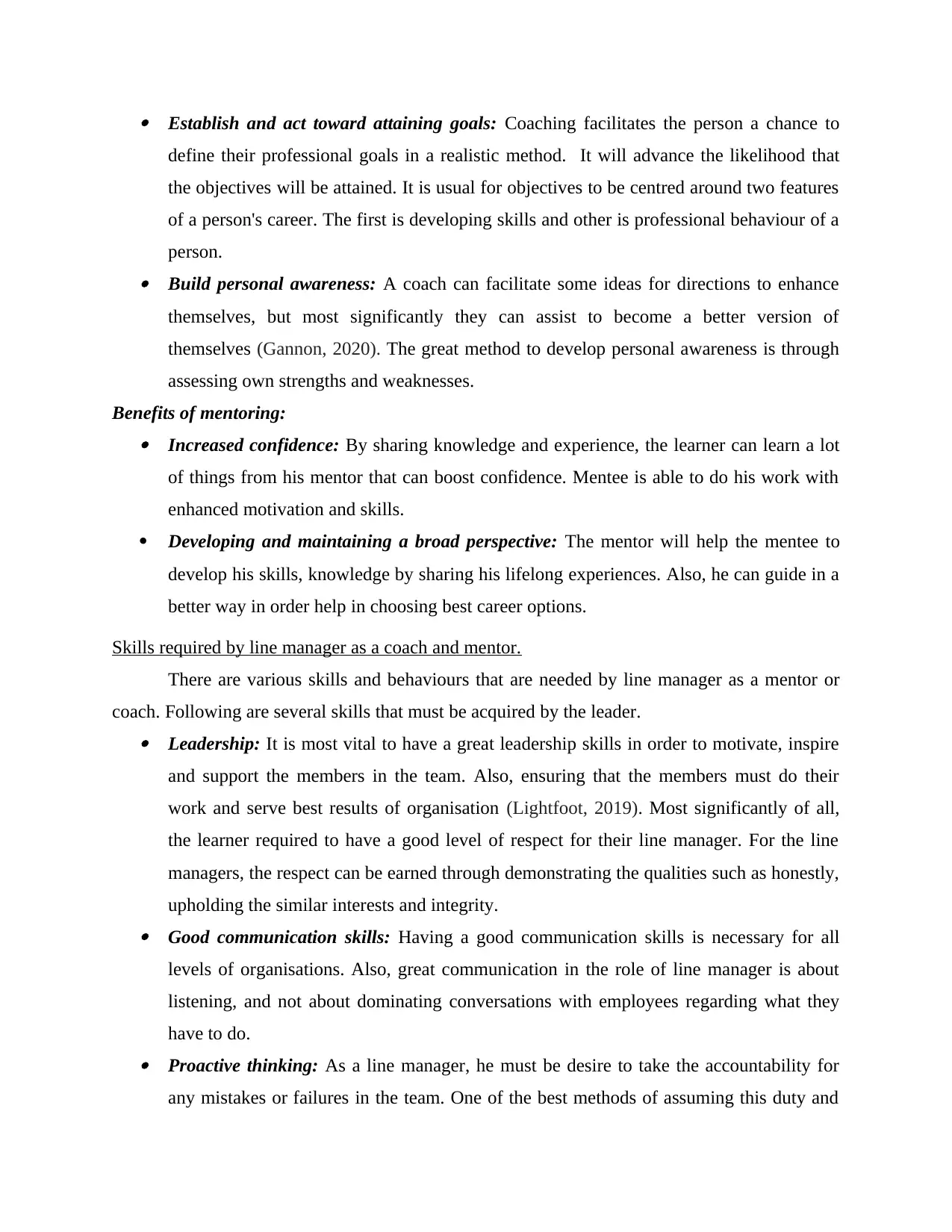
Establish and act toward attaining goals: Coaching facilitates the person a chance to
define their professional goals in a realistic method. It will advance the likelihood that
the objectives will be attained. It is usual for objectives to be centred around two features
of a person's career. The first is developing skills and other is professional behaviour of a
person. Build personal awareness: A coach can facilitate some ideas for directions to enhance
themselves, but most significantly they can assist to become a better version of
themselves (Gannon, 2020). The great method to develop personal awareness is through
assessing own strengths and weaknesses.
Benefits of mentoring: Increased confidence: By sharing knowledge and experience, the learner can learn a lot
of things from his mentor that can boost confidence. Mentee is able to do his work with
enhanced motivation and skills.
Developing and maintaining a broad perspective: The mentor will help the mentee to
develop his skills, knowledge by sharing his lifelong experiences. Also, he can guide in a
better way in order help in choosing best career options.
Skills required by line manager as a coach and mentor.
There are various skills and behaviours that are needed by line manager as a mentor or
coach. Following are several skills that must be acquired by the leader. Leadership: It is most vital to have a great leadership skills in order to motivate, inspire
and support the members in the team. Also, ensuring that the members must do their
work and serve best results of organisation (Lightfoot, 2019). Most significantly of all,
the learner required to have a good level of respect for their line manager. For the line
managers, the respect can be earned through demonstrating the qualities such as honestly,
upholding the similar interests and integrity. Good communication skills: Having a good communication skills is necessary for all
levels of organisations. Also, great communication in the role of line manager is about
listening, and not about dominating conversations with employees regarding what they
have to do. Proactive thinking: As a line manager, he must be desire to take the accountability for
any mistakes or failures in the team. One of the best methods of assuming this duty and
define their professional goals in a realistic method. It will advance the likelihood that
the objectives will be attained. It is usual for objectives to be centred around two features
of a person's career. The first is developing skills and other is professional behaviour of a
person. Build personal awareness: A coach can facilitate some ideas for directions to enhance
themselves, but most significantly they can assist to become a better version of
themselves (Gannon, 2020). The great method to develop personal awareness is through
assessing own strengths and weaknesses.
Benefits of mentoring: Increased confidence: By sharing knowledge and experience, the learner can learn a lot
of things from his mentor that can boost confidence. Mentee is able to do his work with
enhanced motivation and skills.
Developing and maintaining a broad perspective: The mentor will help the mentee to
develop his skills, knowledge by sharing his lifelong experiences. Also, he can guide in a
better way in order help in choosing best career options.
Skills required by line manager as a coach and mentor.
There are various skills and behaviours that are needed by line manager as a mentor or
coach. Following are several skills that must be acquired by the leader. Leadership: It is most vital to have a great leadership skills in order to motivate, inspire
and support the members in the team. Also, ensuring that the members must do their
work and serve best results of organisation (Lightfoot, 2019). Most significantly of all,
the learner required to have a good level of respect for their line manager. For the line
managers, the respect can be earned through demonstrating the qualities such as honestly,
upholding the similar interests and integrity. Good communication skills: Having a good communication skills is necessary for all
levels of organisations. Also, great communication in the role of line manager is about
listening, and not about dominating conversations with employees regarding what they
have to do. Proactive thinking: As a line manager, he must be desire to take the accountability for
any mistakes or failures in the team. One of the best methods of assuming this duty and
Paraphrase This Document
Need a fresh take? Get an instant paraphrase of this document with our AI Paraphraser
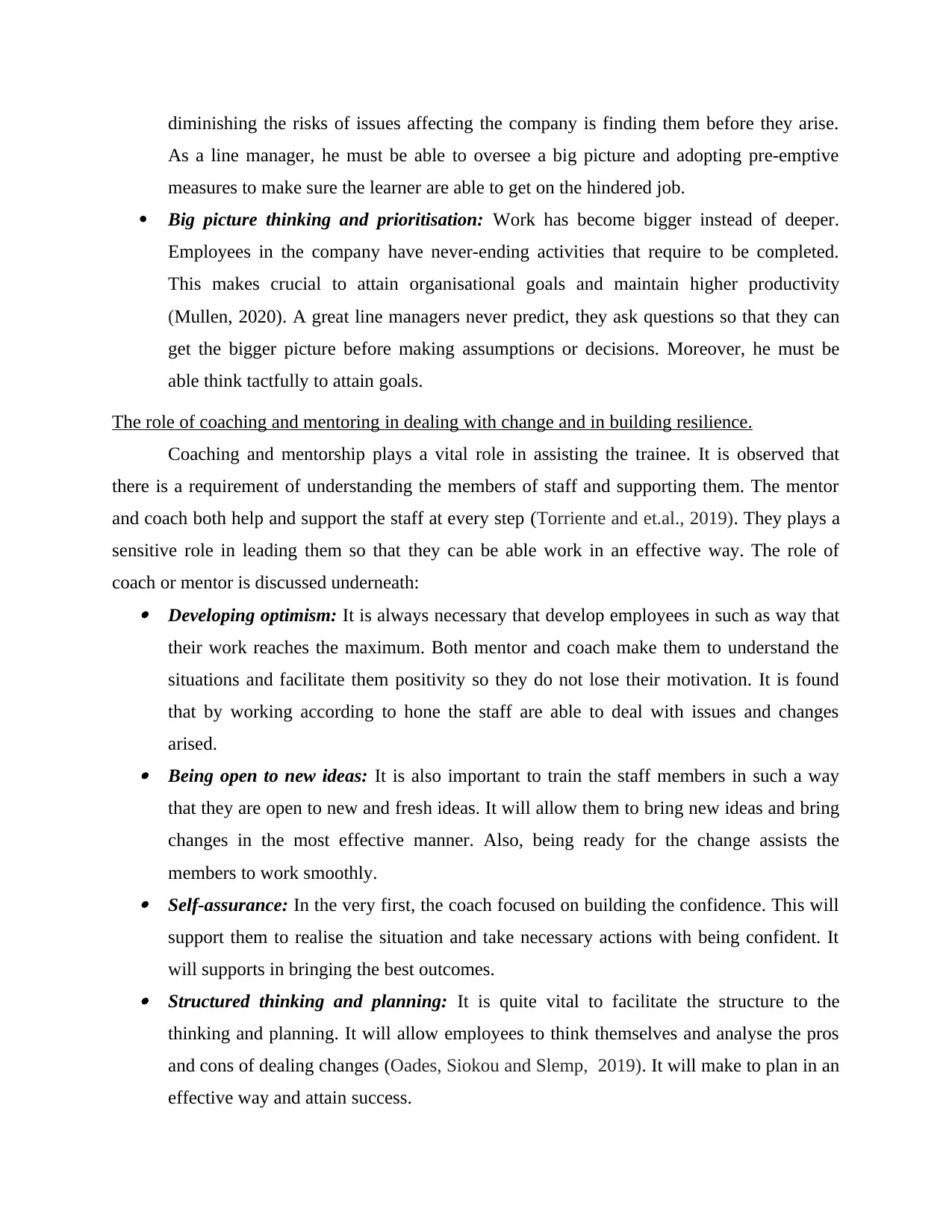
diminishing the risks of issues affecting the company is finding them before they arise.
As a line manager, he must be able to oversee a big picture and adopting pre-emptive
measures to make sure the learner are able to get on the hindered job.
Big picture thinking and prioritisation: Work has become bigger instead of deeper.
Employees in the company have never-ending activities that require to be completed.
This makes crucial to attain organisational goals and maintain higher productivity
(Mullen, 2020). A great line managers never predict, they ask questions so that they can
get the bigger picture before making assumptions or decisions. Moreover, he must be
able think tactfully to attain goals.
The role of coaching and mentoring in dealing with change and in building resilience.
Coaching and mentorship plays a vital role in assisting the trainee. It is observed that
there is a requirement of understanding the members of staff and supporting them. The mentor
and coach both help and support the staff at every step (Torriente and et.al., 2019). They plays a
sensitive role in leading them so that they can be able work in an effective way. The role of
coach or mentor is discussed underneath: Developing optimism: It is always necessary that develop employees in such as way that
their work reaches the maximum. Both mentor and coach make them to understand the
situations and facilitate them positivity so they do not lose their motivation. It is found
that by working according to hone the staff are able to deal with issues and changes
arised. Being open to new ideas: It is also important to train the staff members in such a way
that they are open to new and fresh ideas. It will allow them to bring new ideas and bring
changes in the most effective manner. Also, being ready for the change assists the
members to work smoothly. Self-assurance: In the very first, the coach focused on building the confidence. This will
support them to realise the situation and take necessary actions with being confident. It
will supports in bringing the best outcomes. Structured thinking and planning: It is quite vital to facilitate the structure to the
thinking and planning. It will allow employees to think themselves and analyse the pros
and cons of dealing changes (Oades, Siokou and Slemp, 2019). It will make to plan in an
effective way and attain success.
As a line manager, he must be able to oversee a big picture and adopting pre-emptive
measures to make sure the learner are able to get on the hindered job.
Big picture thinking and prioritisation: Work has become bigger instead of deeper.
Employees in the company have never-ending activities that require to be completed.
This makes crucial to attain organisational goals and maintain higher productivity
(Mullen, 2020). A great line managers never predict, they ask questions so that they can
get the bigger picture before making assumptions or decisions. Moreover, he must be
able think tactfully to attain goals.
The role of coaching and mentoring in dealing with change and in building resilience.
Coaching and mentorship plays a vital role in assisting the trainee. It is observed that
there is a requirement of understanding the members of staff and supporting them. The mentor
and coach both help and support the staff at every step (Torriente and et.al., 2019). They plays a
sensitive role in leading them so that they can be able work in an effective way. The role of
coach or mentor is discussed underneath: Developing optimism: It is always necessary that develop employees in such as way that
their work reaches the maximum. Both mentor and coach make them to understand the
situations and facilitate them positivity so they do not lose their motivation. It is found
that by working according to hone the staff are able to deal with issues and changes
arised. Being open to new ideas: It is also important to train the staff members in such a way
that they are open to new and fresh ideas. It will allow them to bring new ideas and bring
changes in the most effective manner. Also, being ready for the change assists the
members to work smoothly. Self-assurance: In the very first, the coach focused on building the confidence. This will
support them to realise the situation and take necessary actions with being confident. It
will supports in bringing the best outcomes. Structured thinking and planning: It is quite vital to facilitate the structure to the
thinking and planning. It will allow employees to think themselves and analyse the pros
and cons of dealing changes (Oades, Siokou and Slemp, 2019). It will make to plan in an
effective way and attain success.
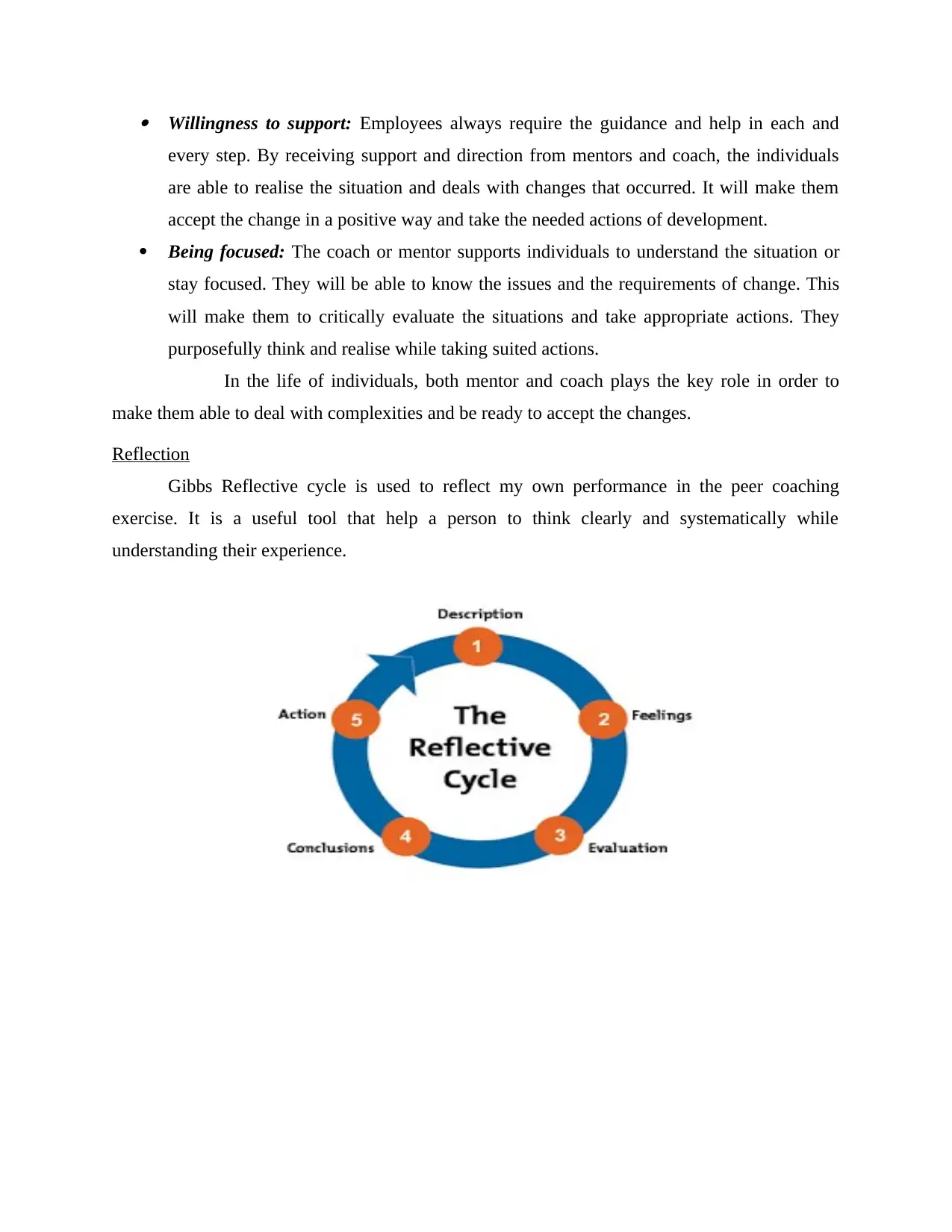
Willingness to support: Employees always require the guidance and help in each and
every step. By receiving support and direction from mentors and coach, the individuals
are able to realise the situation and deals with changes that occurred. It will make them
accept the change in a positive way and take the needed actions of development.
Being focused: The coach or mentor supports individuals to understand the situation or
stay focused. They will be able to know the issues and the requirements of change. This
will make them to critically evaluate the situations and take appropriate actions. They
purposefully think and realise while taking suited actions.
In the life of individuals, both mentor and coach plays the key role in order to
make them able to deal with complexities and be ready to accept the changes.
Reflection
Gibbs Reflective cycle is used to reflect my own performance in the peer coaching
exercise. It is a useful tool that help a person to think clearly and systematically while
understanding their experience.
every step. By receiving support and direction from mentors and coach, the individuals
are able to realise the situation and deals with changes that occurred. It will make them
accept the change in a positive way and take the needed actions of development.
Being focused: The coach or mentor supports individuals to understand the situation or
stay focused. They will be able to know the issues and the requirements of change. This
will make them to critically evaluate the situations and take appropriate actions. They
purposefully think and realise while taking suited actions.
In the life of individuals, both mentor and coach plays the key role in order to
make them able to deal with complexities and be ready to accept the changes.
Reflection
Gibbs Reflective cycle is used to reflect my own performance in the peer coaching
exercise. It is a useful tool that help a person to think clearly and systematically while
understanding their experience.
⊘ This is a preview!⊘
Do you want full access?
Subscribe today to unlock all pages.

Trusted by 1+ million students worldwide
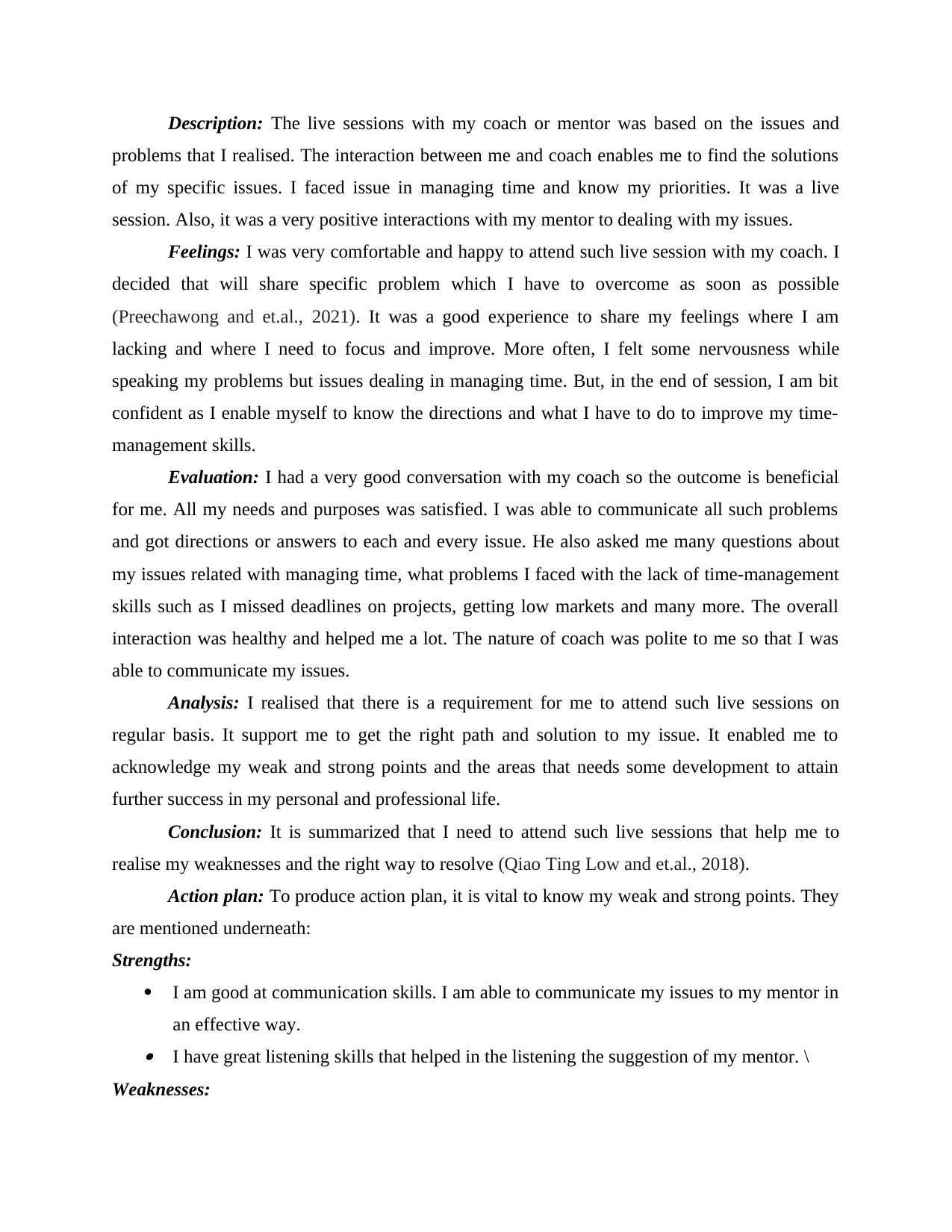
Description: The live sessions with my coach or mentor was based on the issues and
problems that I realised. The interaction between me and coach enables me to find the solutions
of my specific issues. I faced issue in managing time and know my priorities. It was a live
session. Also, it was a very positive interactions with my mentor to dealing with my issues.
Feelings: I was very comfortable and happy to attend such live session with my coach. I
decided that will share specific problem which I have to overcome as soon as possible
(Preechawong and et.al., 2021). It was a good experience to share my feelings where I am
lacking and where I need to focus and improve. More often, I felt some nervousness while
speaking my problems but issues dealing in managing time. But, in the end of session, I am bit
confident as I enable myself to know the directions and what I have to do to improve my time-
management skills.
Evaluation: I had a very good conversation with my coach so the outcome is beneficial
for me. All my needs and purposes was satisfied. I was able to communicate all such problems
and got directions or answers to each and every issue. He also asked me many questions about
my issues related with managing time, what problems I faced with the lack of time-management
skills such as I missed deadlines on projects, getting low markets and many more. The overall
interaction was healthy and helped me a lot. The nature of coach was polite to me so that I was
able to communicate my issues.
Analysis: I realised that there is a requirement for me to attend such live sessions on
regular basis. It support me to get the right path and solution to my issue. It enabled me to
acknowledge my weak and strong points and the areas that needs some development to attain
further success in my personal and professional life.
Conclusion: It is summarized that I need to attend such live sessions that help me to
realise my weaknesses and the right way to resolve (Qiao Ting Low and et.al., 2018).
Action plan: To produce action plan, it is vital to know my weak and strong points. They
are mentioned underneath:
Strengths:
I am good at communication skills. I am able to communicate my issues to my mentor in
an effective way. I have great listening skills that helped in the listening the suggestion of my mentor. \
Weaknesses:
problems that I realised. The interaction between me and coach enables me to find the solutions
of my specific issues. I faced issue in managing time and know my priorities. It was a live
session. Also, it was a very positive interactions with my mentor to dealing with my issues.
Feelings: I was very comfortable and happy to attend such live session with my coach. I
decided that will share specific problem which I have to overcome as soon as possible
(Preechawong and et.al., 2021). It was a good experience to share my feelings where I am
lacking and where I need to focus and improve. More often, I felt some nervousness while
speaking my problems but issues dealing in managing time. But, in the end of session, I am bit
confident as I enable myself to know the directions and what I have to do to improve my time-
management skills.
Evaluation: I had a very good conversation with my coach so the outcome is beneficial
for me. All my needs and purposes was satisfied. I was able to communicate all such problems
and got directions or answers to each and every issue. He also asked me many questions about
my issues related with managing time, what problems I faced with the lack of time-management
skills such as I missed deadlines on projects, getting low markets and many more. The overall
interaction was healthy and helped me a lot. The nature of coach was polite to me so that I was
able to communicate my issues.
Analysis: I realised that there is a requirement for me to attend such live sessions on
regular basis. It support me to get the right path and solution to my issue. It enabled me to
acknowledge my weak and strong points and the areas that needs some development to attain
further success in my personal and professional life.
Conclusion: It is summarized that I need to attend such live sessions that help me to
realise my weaknesses and the right way to resolve (Qiao Ting Low and et.al., 2018).
Action plan: To produce action plan, it is vital to know my weak and strong points. They
are mentioned underneath:
Strengths:
I am good at communication skills. I am able to communicate my issues to my mentor in
an effective way. I have great listening skills that helped in the listening the suggestion of my mentor. \
Weaknesses:
Paraphrase This Document
Need a fresh take? Get an instant paraphrase of this document with our AI Paraphraser
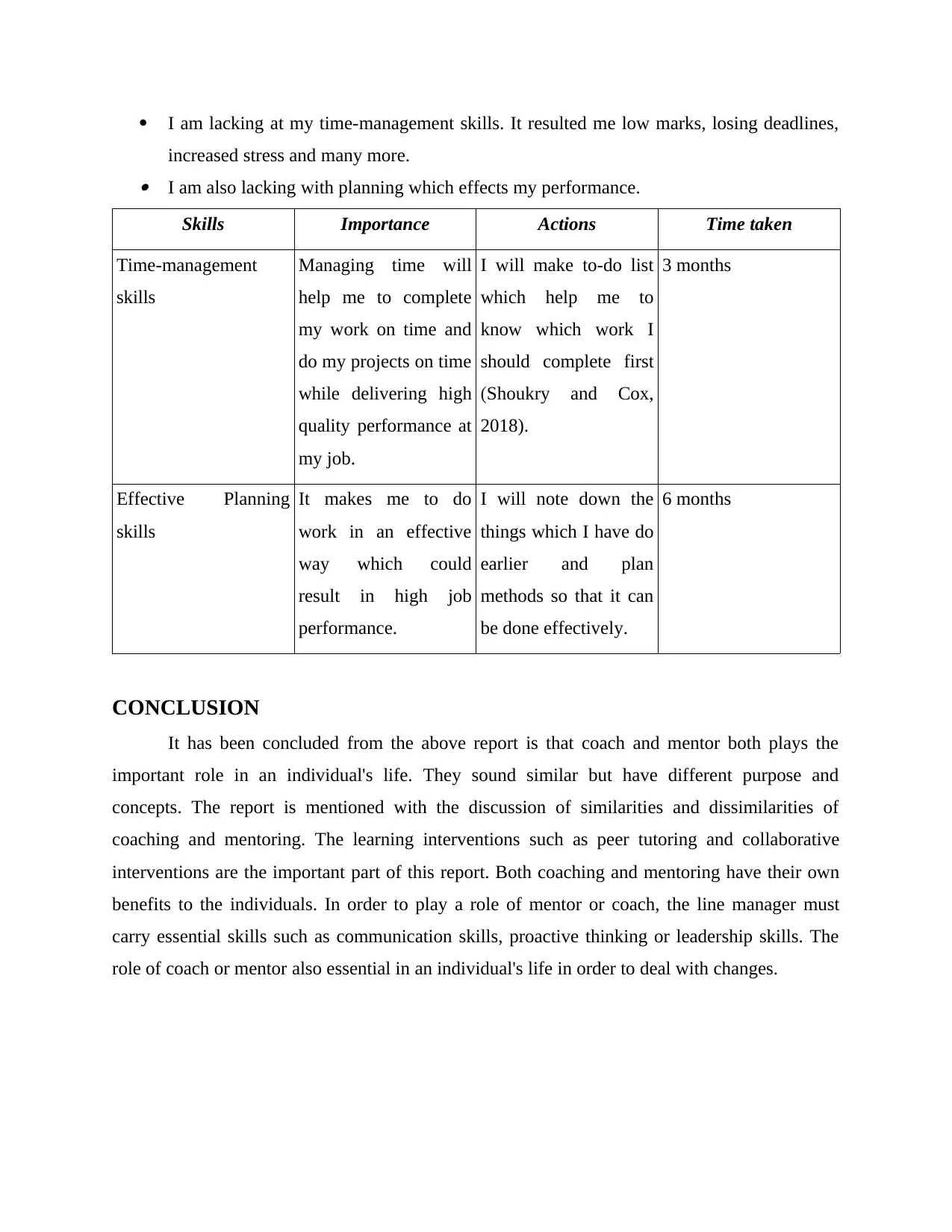
I am lacking at my time-management skills. It resulted me low marks, losing deadlines,
increased stress and many more. I am also lacking with planning which effects my performance.
Skills Importance Actions Time taken
Time-management
skills
Managing time will
help me to complete
my work on time and
do my projects on time
while delivering high
quality performance at
my job.
I will make to-do list
which help me to
know which work I
should complete first
(Shoukry and Cox,
2018).
3 months
Effective Planning
skills
It makes me to do
work in an effective
way which could
result in high job
performance.
I will note down the
things which I have do
earlier and plan
methods so that it can
be done effectively.
6 months
CONCLUSION
It has been concluded from the above report is that coach and mentor both plays the
important role in an individual's life. They sound similar but have different purpose and
concepts. The report is mentioned with the discussion of similarities and dissimilarities of
coaching and mentoring. The learning interventions such as peer tutoring and collaborative
interventions are the important part of this report. Both coaching and mentoring have their own
benefits to the individuals. In order to play a role of mentor or coach, the line manager must
carry essential skills such as communication skills, proactive thinking or leadership skills. The
role of coach or mentor also essential in an individual's life in order to deal with changes.
increased stress and many more. I am also lacking with planning which effects my performance.
Skills Importance Actions Time taken
Time-management
skills
Managing time will
help me to complete
my work on time and
do my projects on time
while delivering high
quality performance at
my job.
I will make to-do list
which help me to
know which work I
should complete first
(Shoukry and Cox,
2018).
3 months
Effective Planning
skills
It makes me to do
work in an effective
way which could
result in high job
performance.
I will note down the
things which I have do
earlier and plan
methods so that it can
be done effectively.
6 months
CONCLUSION
It has been concluded from the above report is that coach and mentor both plays the
important role in an individual's life. They sound similar but have different purpose and
concepts. The report is mentioned with the discussion of similarities and dissimilarities of
coaching and mentoring. The learning interventions such as peer tutoring and collaborative
interventions are the important part of this report. Both coaching and mentoring have their own
benefits to the individuals. In order to play a role of mentor or coach, the line manager must
carry essential skills such as communication skills, proactive thinking or leadership skills. The
role of coach or mentor also essential in an individual's life in order to deal with changes.

⊘ This is a preview!⊘
Do you want full access?
Subscribe today to unlock all pages.

Trusted by 1+ million students worldwide
1 out of 13
Related Documents
Your All-in-One AI-Powered Toolkit for Academic Success.
+13062052269
info@desklib.com
Available 24*7 on WhatsApp / Email
![[object Object]](/_next/static/media/star-bottom.7253800d.svg)
Unlock your academic potential
Copyright © 2020–2026 A2Z Services. All Rights Reserved. Developed and managed by ZUCOL.




